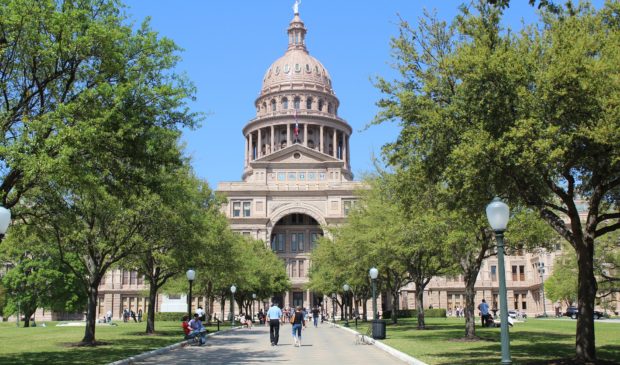Legislature traditions keeping revenue caps at bay, for now
Tuesday, February 19, 2019 by
Ryan Thornton Travis County has a lot to lose if the Texas Legislature decides to discard tradition for the sake of passing the four property tax relief bills that have been filed this session. After Sen. Paul Bettencourt’s Senate Bill 2 was sent out to the Senate on Feb. 11, Deece Eckstein, Travis County’s intergovernmental relations coordinator, warned that the Senate may be preparing to forgo established tradition in order to get the bill on the floor.
Bettencourt’s bill would reduce the county’s property tax rollback rate from 8 to 2.5 percent annually, requiring local elections to approve any tax increases beyond that limit. Gov. Greg Abbott has been a champion of the measure, promising Texans it would protect them from excessive local taxation. Like any Senate bill, however, getting to the floor requires 60 percent approval to hear the bill, or 19 Senate votes.
Without those 19 votes, the only way to get a bill onto the floor is to get the first bill, known as the blocker bill, out of the way. The blocker bill is a long-standing tradition that protects minority parties by ensuring that a bill only comes up for a vote if a supermajority is willing to hear it. But if a political party is desperate to get a bill on the floor, it is technically possible to pass the blocker bill and open the door for other bills, like SB 2, to be taken up without that initial vote.
Given the current storm of partisan enthusiasm at the Capitol, Eckstein told the Commissioners Court last Tuesday that this year’s blocker bill – SB 409, related to the County Parks Beautification and Improvement Program – could be passed to make way for SB 2.
“The rumor is, they don’t have the 19 votes to bring this bill to the floor,” Eckstein said. “So the Senate may actually pass the blocker bill for the first time in memory, thus allowing other bills to come up in the regular order of business.”
For now at least, that worst-case scenario has been avoided. Until March 9, passing the blocker bill would require taking it up as an emergency item, which obviously it is not, and it seems Bettencourt’s cohort is not ready to step that far out of line. But after that date, the bill, protected only by years of tradition and bipartisan respect, could theoretically be passed by a standard two-thirds vote.
Short of passing the blocker bill, the only option for SB 2 is to bring it back to a committee for amendment. Despite the resolve of the bill’s proponents, the only way to make the bill more attractive will be to lessen the financial impact it will have on counties and cities by raising the proposed rollback rate up from 2.5 percent. But the bill will require at least 16 votes to be sent back for amendment, which isn’t a guarantee either.
As is, SB 2 would cost Travis County counties across the state $1,142,426,000 over five years unless county residents were uncharacteristically willing to approve higher tax rates in May November 2020. At the same time, the bill offers no financial assistance from the state or any mechanism to help counties and cities make up for that revenue loss. As Eckstein noted, the bill does not even address the issue of unfunded state mandates and how local governments would be able to remain in compliance with those mandates.
“This bill lowers our revenue without lowering the needs of the communities we serve or the mandates that the state gives us about how we have to serve them,” Eckstein said.
County Judge Sarah Eckhardt said the threat of the 2.5 percent cap is real enough to merit discussion in the coming weeks concerning how the county would allocate its funds. She suggested the court consider the various hypothetical scenarios in the coming weeks, “just as an exercise, hopefully.”
Planning and Budget County Executive Jessica Rio said the financial reductions would be registered “across the board,” regardless of how the county chose to use its funds going forward.
The Austin Monitor’s work is made possible by donations from the community. Though our reporting covers donors from time to time, we are careful to keep business and editorial efforts separate while maintaining transparency. A complete list of donors is available here, and our code of ethics is explained here.
You're a community leader
And we’re honored you look to us for serious, in-depth news. You know a strong community needs local and dedicated watchdog reporting. We’re here for you and that won’t change. Now will you take the powerful next step and support our nonprofit news organization?











